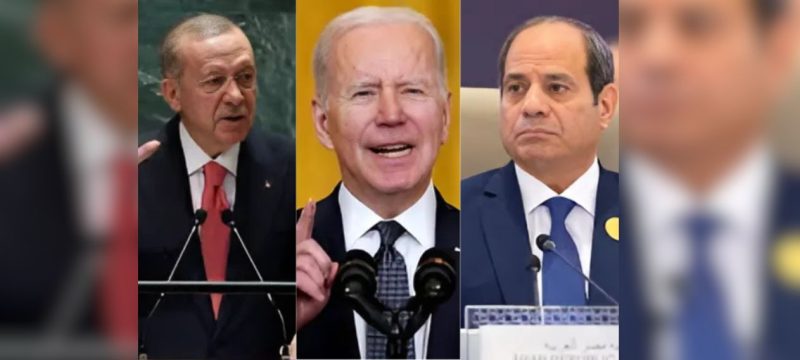World leaders have reacted to the ceasefire agreement between Israel and Hamas, which was established on Wednesday to end the ongoing Israeli military campaign in Gaza.
Responses have varied, with leaders focusing on different aspects of the deal, such as its potential for providing humanitarian aid or its broader impact on regional stability.
US President Joe Biden:
President Biden confirmed the ceasefire and hostage agreement, stating that the fighting in Gaza would cease, and hostages would soon return to their families. He also expressed hope for a “credible pathway” towards Palestinian statehood and normalization for Israel, including relations with Arab nations like Saudi Arabia.
Read more: Hamas and Israel Sign Ceasefire Deal, Sparking Hopes for Peace in Gaza
US President-elect Donald Trump:
Trump shared the news on his Truth Social platform, confirming the hostages’ release. He highlighted that his National Security team would continue working to ensure Gaza doesn’t become a “terrorist safe haven.”
UN Secretary-General Antonio Guterres:
Guterres expressed the UN’s readiness to support the ceasefire’s implementation and provide humanitarian aid, stressing the need for unhindered access to Gaza for delivering “lifesaving humanitarian support.”
Former US President Barack Obama:
Obama welcomed the ceasefire deal as a positive step, pointing out that it halted the bloodshed and allowed for much-needed aid to reach Gaza.
Turkish Foreign Minister Hakan Fidan:
Fidan called the ceasefire an important milestone for regional stability and reiterated Turkey’s support for a two-state solution to the Israeli-Palestinian conflict.
Qatar’s Prime Minister Sheikh Mohammed bin Abdulrahman Al Thani:
Sheikh Mohammed urged for calm in Gaza, with the ceasefire set to take effect on January 19. He called for an end to the violence and destruction.
Egyptian President Abdel Fattah Al-Sisi:
President Al-Sisi welcomed the ceasefire, stressing the urgency of delivering humanitarian aid to Gaza without delay.
International Committee of the Red Cross President Mirjana Spoljaric:
Spoljaric endorsed the deal but urged that civilian protection remain a priority and that the ceasefire be honored by all parties.
European Commission President Ursula von der Leyen:
Von der Leyen expressed hope that the ceasefire could alleviate suffering in Gaza, underscoring the importance of the deal’s full implementation as a step towards long-term peace.
UAE Foreign Minister Sheikh Abdullah bin Zayed:
The UAE emphasized the need for both sides to honor their commitments and for humanitarian aid to flow freely.
Qatari Emir Sheikh Tamim bin Hamad Al Thani:
The Emir expressed hope that the ceasefire would bring an end to violence in Gaza and mark the beginning of a new phase for the Palestinian cause.
Saudi Arabia’s Foreign Ministry:
Saudi Arabia welcomed the deal and thanked the mediating countries. It emphasized the necessity for Israel’s full withdrawal from Gaza and the resolution of core issues in the conflict.
Mohammed Abdulsalam, Spokesperson for Yemen’s Houthis:
Abdulsalam praised Gaza’s resilience and criticized Israel’s occupation, calling it a regional threat.
South African Government:
South Africa welcomed the ceasefire and condemned Israel’s actions in Gaza, advocating for a just peace solution that respects both Palestinian and Israeli rights.
Australia’s Prime Minister Anthony Albanese:
Albanese called the ceasefire a constructive step toward peace but also stated that Hamas should not have a role in Gaza’s future governance.
Cindy McCain, Executive Director of the World Food Program:
McCain emphasized that the ceasefire should facilitate the large-scale delivery of food to Gaza, with secure and open border crossings.
Belgium’s Prime Minister Alexander De Croo:
De Croo expressed relief for the hostages and their families, hoping the ceasefire would lead to lasting peace and stability.
German Foreign Secretary Annalena Baerbock:
Baerbock hoped the ceasefire would provide an opportunity to end the conflict, stressing the need for responsible action from all parties involved.
British Prime Minister Keir Starmer:
Starmer underscored the urgency of delivering humanitarian aid to Gaza and called for a permanent solution based on a two-state framework.
Norwegian Prime Minister Jonas Gahr Støre:
Støre emphasized the importance of strengthening Palestinian institutions and providing security guarantees for both sides.
Spanish Prime Minister Pedro Sánchez:
Sánchez described the ceasefire as essential for achieving regional stability and advancing a two-state solution.
Pakistan’s Response:
A spokesperson from Pakistan’s Foreign Office expressed deep concern over the immense loss of lives and destruction in Gaza, calling it a “genocidal onslaught.” Pakistan reiterated its support for a comprehensive and lasting solution to the Palestinian issue, advocating for a sovereign Palestinian state based on the 1967 borders, with Jerusalem as its capital.









